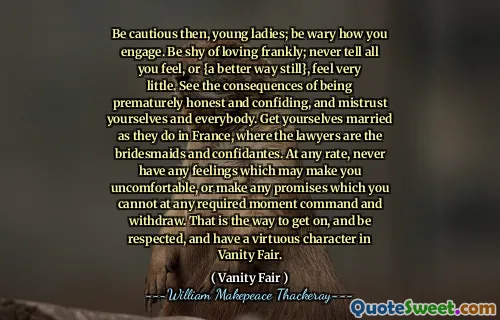"Vanity Fair," a novel by William Makepeace Thackeray, portrays the lives of two contrasting women, Becky Sharp and Amelia Sedley, as they navigate the complexities of society in early 19th-century England. The story delves into themes of ambition, social status, and morality, showcasing the ruthless nature of the upper classes. Through the lens of their experiences, readers witness the pursuit of wealth and admiration that ultimately reveals the characters' true natures.
Becky Sharp, a cunning and charming anti-heroine, manipulates those around her to ascend the social ladder. In contrast, Amelia Sedley embodies innocence and virtue but struggles to assert herself in a society that often undermines her values. Their differing approaches to life highlight the era's societal expectations and the often superficial nature of relationships.
The novel employs satire to critique the social hierarchy and the emptiness of vanity. Thackeray's engaging narrative, rich character development, and sharp wit cement "Vanity Fair" as a timeless exploration of human nature, ambition, and the pursuit of happiness amid a fickle society. Through laughter and reflection, readers confront the moral dilemmas that accompany the quest for success.
More »
Today Birthdays
1955 -
Max Lucado
1946 -
John Piper
1842 -
William James
1907 -
Abraham Joshua Heschel
1887 -
Aldo Leopold
1755 -
Alexander Hamilton
1976 -
Alethea Kontis
1971 -
Mary J. Blige
1825 -
Bayard Taylor
1943 -
Jim Hightower
1885 -
Alice Paul
1923 -
Carroll Shelby
1928 -
David L. Wolper
1954 -
Kailash Satyarthi
1972 -
Amanda Peet
1946 -
Naomi Judd
1970 -
Malcolm D. Lee
1955 -
Christian Marclay
1973 -
Rahul Dravid
1987 -
Jamie Vardy
1942 -
Clarence Clemons
1992 -
Fatima Sana Shaikh
1948 -
Larry Harvey
1930 -
Rod Taylor
